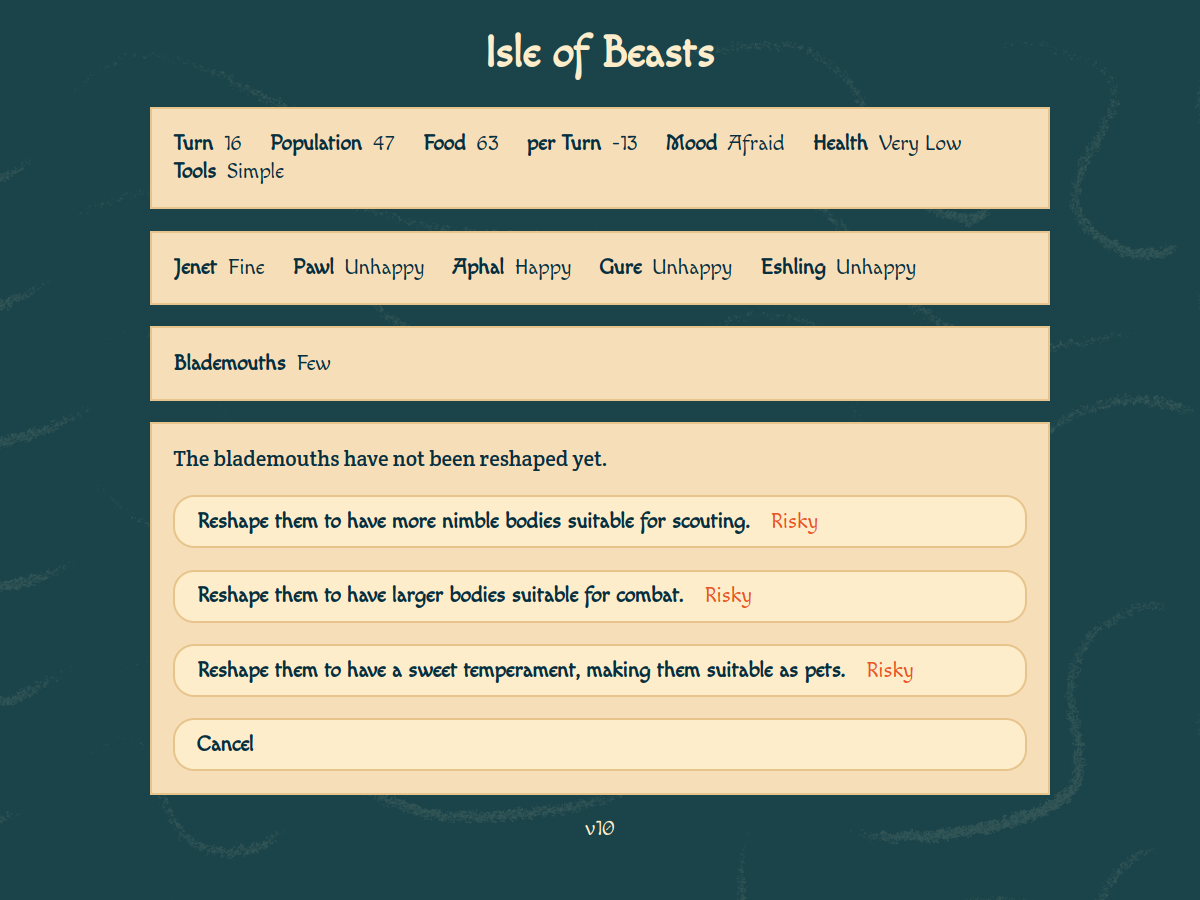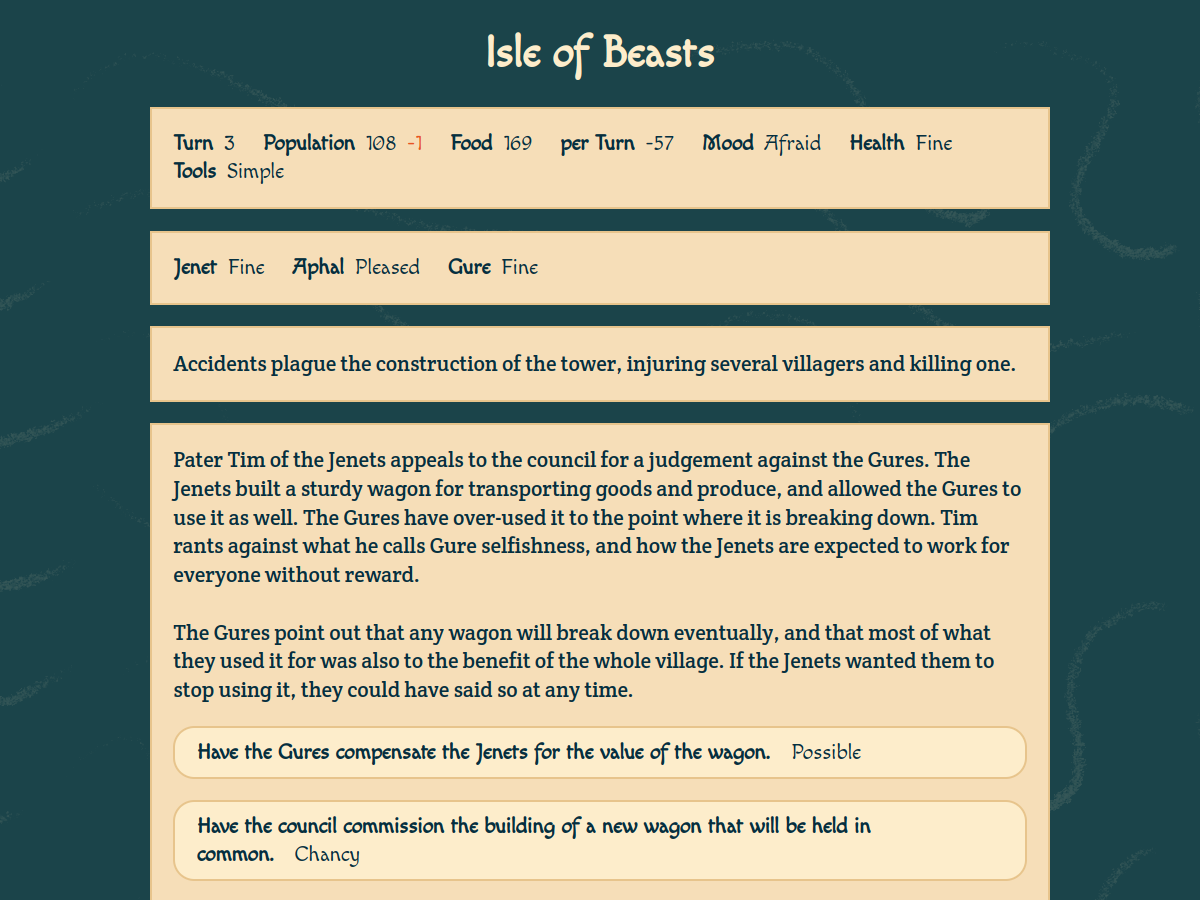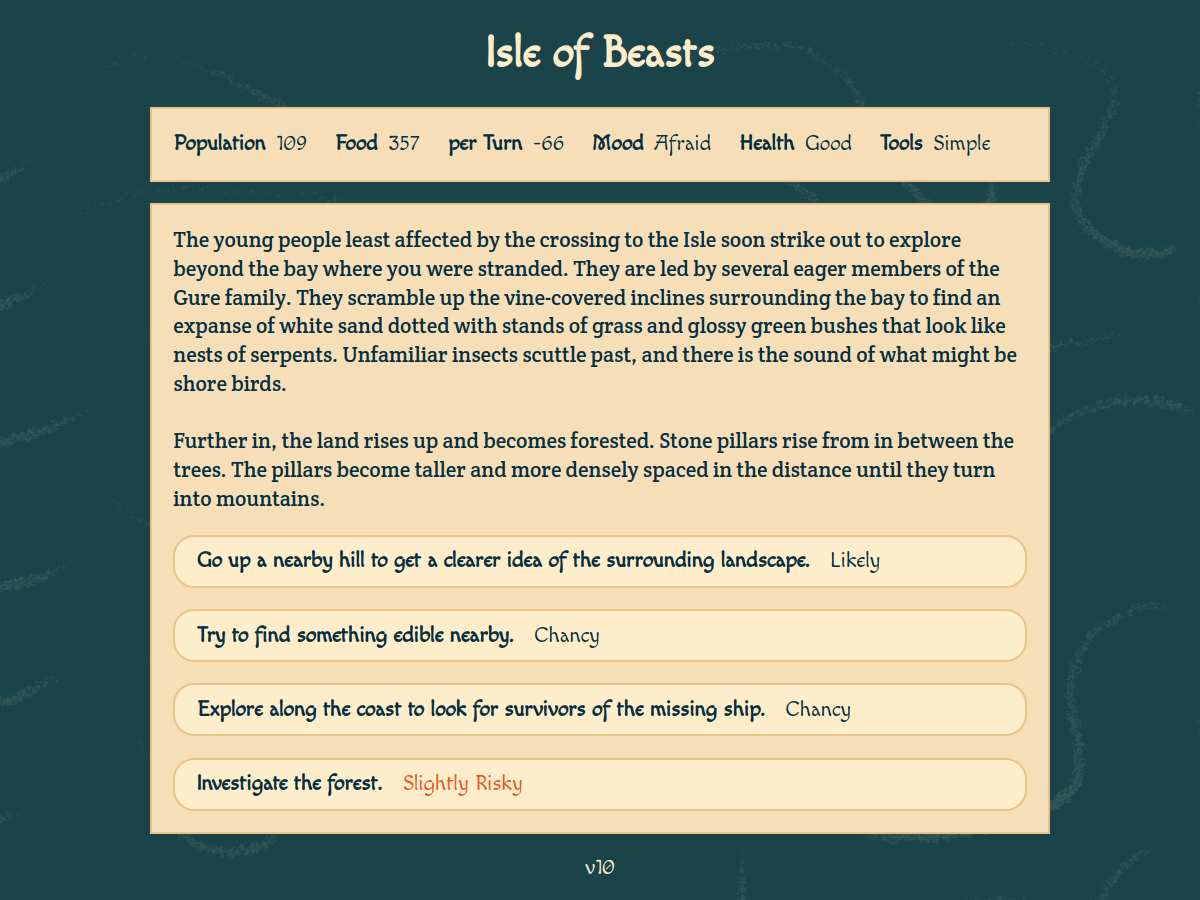Development
In Secret Santa Jam, your giftee sends you a message describing what kind of games they like, so you can tailor your design to their preferences. My giftee indicated that they especially liked games about animals. At the same time, I'd become re-obsessed with Six Ages: Ride Like the Wind, a kind of narrative/strategy game about leading a tribe in a fantasy world. So I decided to mash those two things up and make a game about leading a tribe in a strange land full of strange animals. Sort of Six Ages meets Pokemon.
Then, about a week in, my giftee dropped out. I asked to be assigned a new giftee, who then also dropped out after a few days. So after that, I decided to just go ahead with the game design I had already started with.
But I totally underestimated the amount of writing I'd have to do for this game to work: more than a hundred storylets (small story snippets usually containing a single player decision). And of course the deadline for the jam no longer really applied, and then there was the holidays, and so all in all the game took from early December until mid-January to make. The final version has about 160 storylets, and who knows how many words of text!
The Game
So in Isle of Beasts, you play as a small group of people who have been exiled from their country and forcibly relocated to a strange and dangerous island. You have to explore the place, build a new village, find enough food to survive, defend against monsters, and eventually overcome a huge crisis that threatens to wipe you out.
Along the way, you can domesticate a number of weird animals such as blademouths - think cats with beetle pincers. And not only can you domesticate them, you can also use the isle's mysterious powers to reshape them physically, altering them to be more useful for certain tasks.

Goals
As I said, the game is heavily inspired by Six Ages. Unfortunately, as much as I love it, I have to say that it's pretty inaccessible for newcomers. When you start, you are presented with a bewildering array of concepts, including more than a dozen gods with different abilities. After the game setup, you are shown a screen that asks you to spend your ritual magic in certain areas, which only adds to the confusion. It's not actually as bad as it looks - that screen is basically a worker assignment screen - but a lot of people just bounce off that initial experience. I certainly did the first time I tried it.
So I wanted to give my game a gentler on-ramp, where players are given information and options bit by bit rather than all at once. An great example of this approach is A Dark Room, which starts out with the player having literally just one button they can click. (Fun fact: I contributed a bit of code to A Dark Room - medicine and its related encounters.)
The second thing was more events about life and conflicts inside the tribe. In Six Ages, your people are divided into seven families, but these families have no characteristics apart from their names. I thought this was a missed storytelling opportunity.
Finally, there is only one way to win Six Ages, with some minor variations. It's a really good story, and it makes sense given the context. But once you've seen it, you know what to aim for in subsequent playthroughs, and you know that all other plot threads that look like they might lead to victory are dead ends. I wanted a game where there were multiple forms of victory.
So how do I think I scored on these three goals? First off, this can't be a direct comparison between Six Ages and Isle of Beasts. Six Ages is a polished product that took its team years to develop. It's much broader and longer than my game, and it has a lot of systems and concepts that I didn't even attempt to add to mine. So I'll be narrowly focusing on those goals, rather than comparing the games as a whole.
A gentler on-ramp
I think I succeeded fairly well there. You are still given a few stats at the start of the game, but they're pretty straightforward things like how many people you have, and how much food. You initially have just three possible actions: Explore, Forage, and Build Village. Over time, this vocabulary of actions expands to about a dozen. And as you get to know the families in your tribe and start domesticating animals, the relevant information appears.
So everything is revealed much more gradually, and the player doesn't feel so overwhelmed. Of course, Isle of Beasts is also just a much simpler game than Six Ages, but even so, I think this approach would work well even with a very complex game.
More internal events
I'd say I succeeded at least partially. There are five families with distinct cultures and personalities, which are revealed to the player through a series of events, including various conflicts between the families that show off their differences.

The families also each have a matriarch or patriarch, the idea being that having consistent characters across games lets the players build up an emotional connection with them. But I don't think I really succeeded in painting them as characters distinct from just being the voices of their families. There's definitely room for improvement here.
Another thing I considered here and didn't have time for is to make the player a specific character in the game rather than the "will of the council of elders". If the player is a specific person belonging to a family, more potential for drama is unlocked: do the people trust you to make good, impartial decisions? And what happens when your family expect you to give them special treatment?
Multiple forms of victory
I tried doing this, but because we're talking about a jam game, there's no more variation than in Six Ages, arguably even less. Yes, there are multiple ways to overcome the final crisis at the end of the game, but it's always the same crisis, and so it comes down to picking one of a handful of things to become good at to win the game.
Of course, this is likely the same tradeoff that the developers of Six Ages made: they'd rather have one interesting and well-written ending than half a dozen threadbare ones. Would it be worth adding the extra work to make the game more replayable? Maybe.
Conclusion & Future Possibilities
All in all, I'm very pleased with what I made. Yes, I didn't fully succeed at all my goals, but aiming high and seeing what happens is the point of jams and prototypes. And the game is definitely playable and re-playable and enjoyable.
At this point, I need to go back to my actual work on Airships: Conquer the Skies, where I have bugs to fix and a DLC to develop, but if I was to continue on Isle of Beasts, I'd want to add more events, more interesting family conflicts, and more detailed characterisation for the family leaders.
To improve replayability, I would add the following scheme: Each playthrough, the game randomly selects one obstacle, one advantage, and one endgame.
An obstacle is some additional complication to the game: there's a religious schism, or there's pirates that want to turn your village into a pirate base, or your people keep turning into birds.
An advantage is something that makes an aspect of the game easier: this might be as simple as abundant food to forage, or it might be another creature to domesticate, or some other abundant resource or helpful circumstance.
Finally, an endgame is the big threat that you have to overcome at the end of the game. Right now, there's exactly one of those, but under this new system, it can be one of a number of different things, and you won't know which it is until the midgame. Perhaps the people who sent you into exile are coming back to kill you off for good. Maybe there's ever-worsening earthquakes. Or a mysterious disease.
So by combining an obstacle, and advantage, and an endgame, you'd hopefully get this recombination effect where each playthrough is quite different and needs a different approach to win. Pirates + Abundant Food + Earthquakes would play differently from Schism + Trainable Flying Monkeys + Mystery Disease.
So maybe I'll go back to the game and add these things at some point. For now, I'm happy to leave the Isle of Beasts as it is. And you should go and play it!
